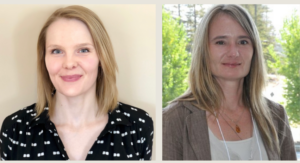 Webinar presented by Emily Hellmich (University of Arizona) and Kimberly Vinall (UC Berkeley Language Center). See the abstract below the webinar recording on this page.
Webinar presented by Emily Hellmich (University of Arizona) and Kimberly Vinall (UC Berkeley Language Center). See the abstract below the webinar recording on this page.
➣ Click here for the webinar slides.
➣ Visit the accompanying website, where you will find instructional strategies for how to navigate machine translation and related online tools in the second language classroom.
Abstract:
Google Translate and other machine translation platforms can be a source of strife and confusion in language learning classrooms. Many instructors wonder if and how to handle these platforms with their students. This webinar presents a series of instructional strategies for how to approach machine translation platforms in the language classroom. These strategies come from findings of a research study that used screen recording and retrospective interviews to observe how foreign language learners (French, Spanish, Mandarin) actually use machine translation platforms while completing a writing task. In the webinar, we present key findings from the study and explore the implications they have for instructional practices.
By the end of the webinar, participants will be able to: 1) broadly describe how students actually use machine translation; 2) identify a range of instructional strategies in three areas (training, assignment creation, policies); and 3) reflect on how to integrate take-ways from the webinar into their own teaching/learning contexts.
Bios:
Emily Hellmich is an assistant professor of French & Second Language Acquisition/Teaching at the University of Arizona. Her work focuses on the impact of our global, digital world on language education. Her research has appeared in Teachers College Record, CALICO, Foreign Language Annals, and Computer Assisted Language Learning.
Kimberly Vinall is the Executive Director of the UC Berkeley Language Center. In her research she explores the relationships between languages, cultures, identities, and ideologies to explore the constructions of linguistic and cultural difference and their implications. She has published in the fields of education, applied linguistics, and SLA.
Registration closes at 5 p.m. on September 28, 2021.
Participants attending can request a certificate of attendance for 1.5 hours of Continuing Education during the live event; or they can request a digital badge after the event.

